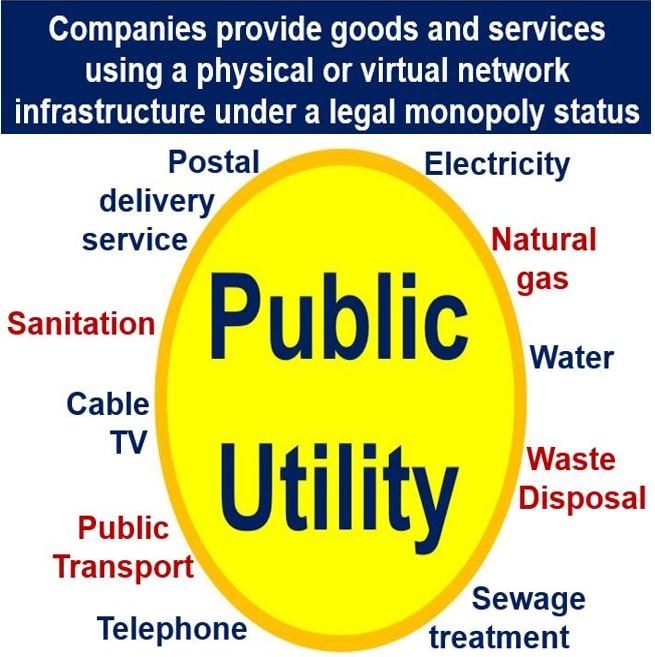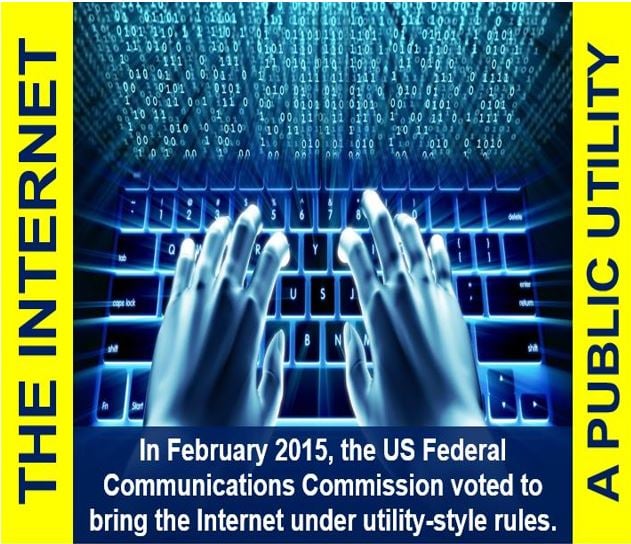A public utility is a company that operates as a public-service corporation, and provides essential services to the public such as electricity, telephone service, natural gas, water or postal services. The public utility is typically regulated by the national, state or local government. The term ‘public utility’ may also refer to the service or product itself – water, natural gas, sewage, etc. – that these organizations supply to members of the public.
A public utility often forms part of a natural monopoly. A natural monopoly is a monopoly that exists because a specific market’s economies of scale make it the most cost-effective way to provide consumers with the best quality and price.
For example, if several companies operated in the supply of tap water, each one with its own infrastructure, the additional costs of having more than one water pipeline would not benefit the consumer, and would raise prices considerably.

Monitoring a public utility
These natural monopolies are either state-owned or private-sector commercial enterprises that are closely monitored by a public utilities commission or similar government agency.
The government agency limits how much the public utility can charge consumers, and may insist that even those who cannot afford to pay the market price are still supplied – this is called a universal service obligation.
Left to itself in a natural monopoly environment, a private-sector public utility would make decisions that are most profitable for the business. Such decisions would lead to high prices and the minimum of service compared to competitive conditions.
These decisions might not be in the best interests of society. State agencies that monitor public utilities aim to make sure these services are economically accessible to most or all of the population.

When a public utility is state-owned, the government usually creates autonomous bodies to protect them from day-to-day political interference. In the majority of cases, state-owned public utilities tend to be less efficient than their counterparts in the private sector.
Public utility and new technologies
With breakthroughs in technology, the nature of regulation changes – what used to be a natural monopoly suddenly becomes a competitive marketplace.
New technologies have allowed parts of electricity generation and distribution, as well as natural gas, to be serviced by a number of competing players rather than just one.
In the UK today, electricity is distributed by ‘The Big 6’ – British Gas (it also sells electricity), EDF Energy, E. ON UK, Npower, Scottish Power and SSE.
Broadband Internet access – a public utility?
If the traditional telephone service is a public utility, so shouldn’t broadband Internet access also be? That is a question that arose about one decade ago.
In all the advanced economies, and a growing number of emerging economies, the Internet has replaced traditional telephone services as the most essential communications utility. Some people say it has become as important today as electricity was a century ago.
Three years ago, tech policy expert, Susan Crawford, who teaches law at Cardozo Law School, part of Yeshiva University in New York City, put forward this question in her book – Captive Audience: The Telecom Industry and Monopoly in the New Gilded Age.
Prof. Crawford wrote:
“Truly high-speed wired Internet access is as basic to innovation, economic growth, social communication, and the country’s competitiveness as electricity was a century ago, but a limited number of Americans have access to it, many can’t afford it, and the country has handed control of it over to Comcast and a few other companies.”
According to Prof. Crawford, the US government has allowed a small group of massive, highly-profitable companies to totally dominate the Internet broadband market. Consequently, Americans have fewer choices for broadband services and have to pay higher prices than consumers in other developed nations.
In an interview with Time Magazine, Prof. Crawford said:
“In Seoul (South Korea), when you move into an apartment, you have a choice of three or four providers selling you symmetric fiber access for $30 per month, and installation happens in one day.”
“That’s unthinkable in the United States. And the idea that the country that invented the Internet can’t get online is beyond my imagination.”
In 2015, the Federal Communications Commission in the US voted to apply the same rules that govern the telephone service to broadband, i.e. the Internet effectively became a public utility in America.
Video – Should the Internet be a public utility?
According to this PBS Idea Channel, the Internet is not officially a public utility yet. It then says: Should it be? That is an interesting question.”
